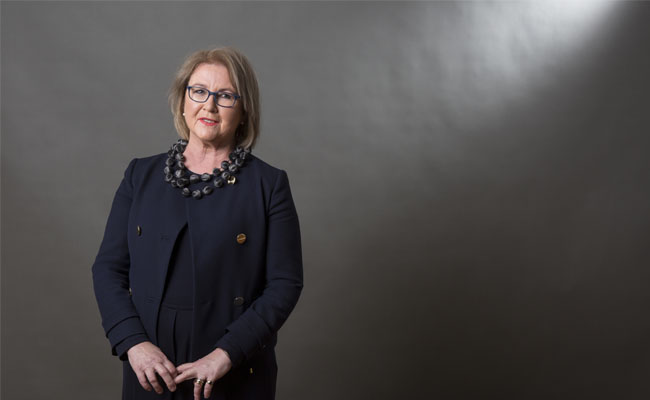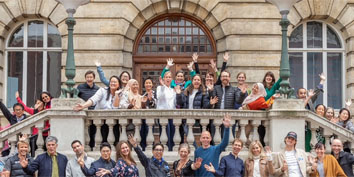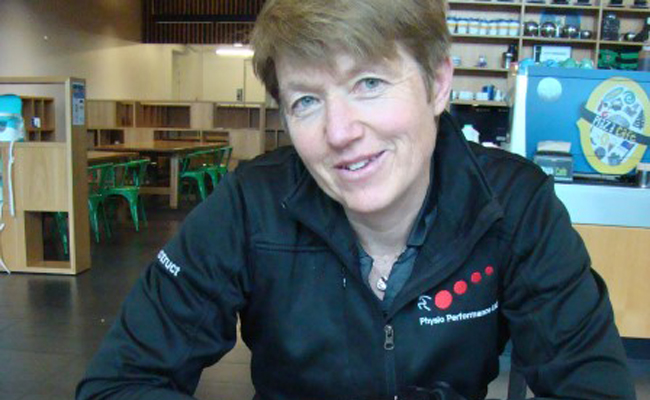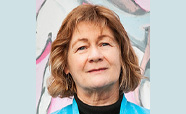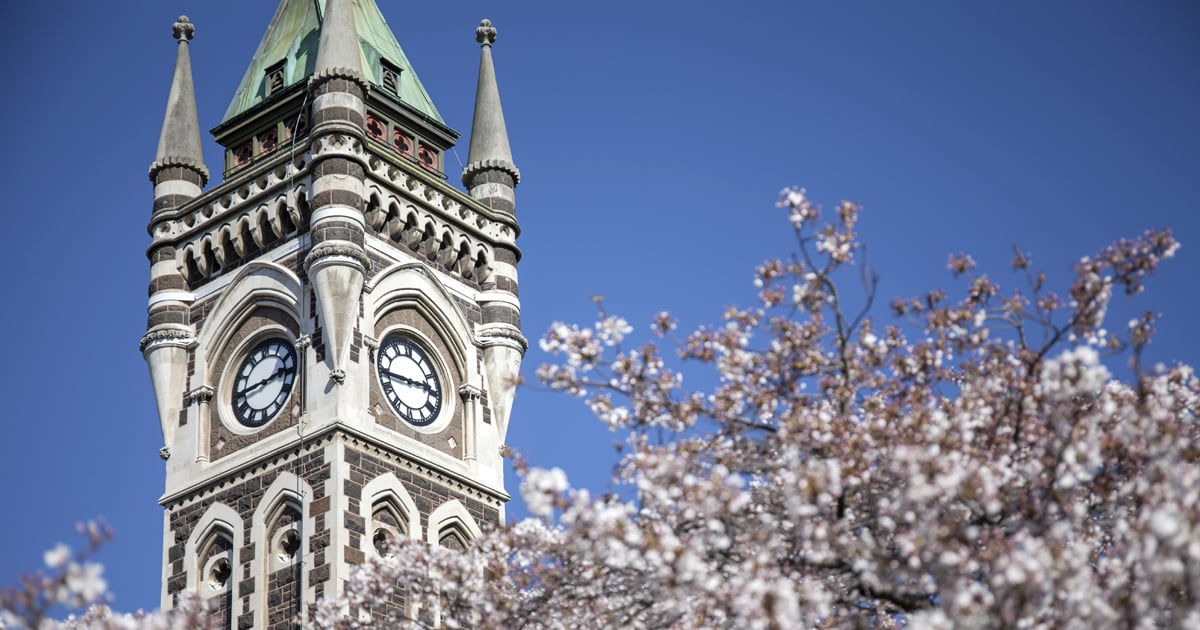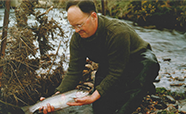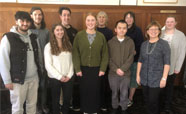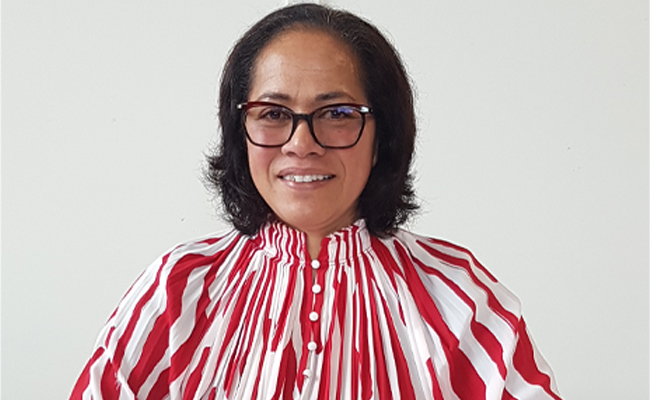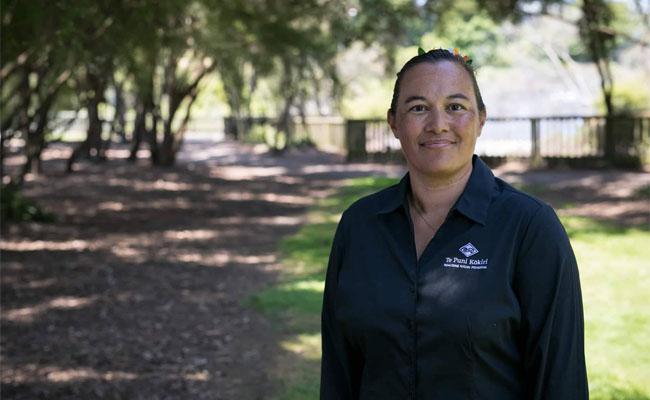Thursday 10 November 2022 2:42pm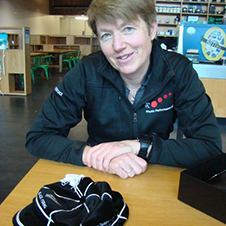
Founding Black Fern and Otago alumna Helen Littleworth with her Black Ferns cap
Watching the current Women's Rugby World Cup has reminded Otago alumna Helen Littleworth of the “complete and utter honour” she felt representing Aotearoa New Zealand as a Black Fern at the first officially recognised Women's Rugby World Cup in 1991.
“It brings back what an honour and privilege it was. I'm very proud to have been part of that,” says Helen, who was a member of the first official New Zealand Women's Rugby Team in 1989. She was a loose forward and captained the team between 1990-1994, including at the 1991 World Cup. Before her selection for the Black Ferns, Helen represented New Zealand at hockey.
“The women's rugby team was so special. It was like my extended family and always will feel like that. The ability to be the captain and leader of that family was very special.”
Helen graduated from Otago with a PGDip and Master of Manipulative Therapy (1995 and 2000), and during her career has worked as a physiotherapist for the White Ferns (cricket) and Black Ferns, with high performance athletes, and Olympic, Paralympic and Commonwealth Games teams. She is also Director of Dunedin business Physio Performance and this year coached the Otago University Rugby Football Club's (OURFC) Women's team.
She says playing any sport at university, and certainly rugby, is a great opportunity to develop important life skills.
“You have a commitment to a team, you have to manage your time, and turn up to training. And you have such good fun with your mates,” she says. “Playing team sport while studying also allows you the chance to get away from study. University is such a good time to learn these skills.”
She says she particularly values the friendships she has formed through playing rugby and loves the game “for the fact that any woman – short, tall, fast, slow, wide or skinny can play the game. That is a big thing I still cherish. It's a beautiful game, and you can kick, pass or run, but anyone can play it, any physique. And being with your mates, knowing they have your back. It's such a complete team game.”
Helen says she's enjoying watching the dedication and commitment of the current Black Ferns, and the way they believe in themselves, “which is so cool to see”.
“It's definitely inspiring for young women, they can see a pathway in professional sport and see distinct steps, which can become a career, when in our day [rugby] was done alongside getting your career organised.”
Other OURFC and Otago alumnae who have played for the Black Ferns include Dr Farah Palmer ONZM, Hannah Porter, Annaleah Rush and Amy du Plessis.
Otago's Professor of Sport and Exercise Psychology, Ken Hodge, was involved with the establishment of women's rugby at OURFC, coaching the first women's team in 1990, alongside colleague Andy Stewart.
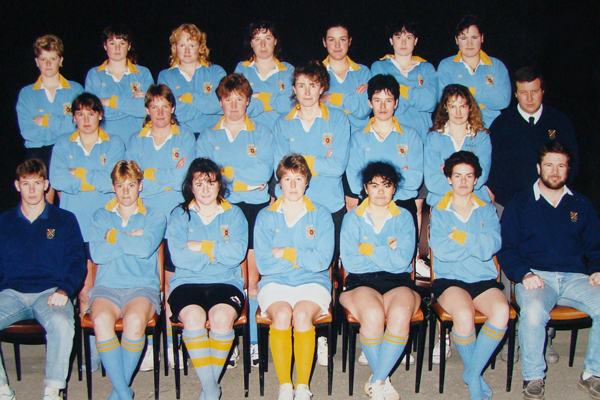
The first women's OURFC rugby team, in 1990, with co-coach Professor Ken Hodge (front row, far right)
Professor Hodge had previously coached the Better Side women's rugby team while studying at the University of Montana, which he says was his first experience of women's rugby being taken seriously. He also played for Otago's Varsity A and is a Life Member of OURFC.
Initially women's games were played on Sundays, as many of the women also played netball or hockey on Saturdays, but eventually they joined the Saturday competition.
“In terms of women's rugby developing it was the best thing to happen, to become a more obvious part of the club, because they were there on Saturdays at the after-match function and all of that off-field stuff that make club sports such a unique opportunity,” says Professor Hodge.
He says the addition of women brought a new and different vibe of fun and enjoyment to the club.
“Coaching the team was great fun because they were so enthusiastic, so coachable, unlike some men who think they know it all. Because even though at that stage touch football was already fairly common and a number of those women would have played touch and had ball handling skills and some of the spatial awareness of how rugby sets up, for many of them the contact part of the game was very new and they were just really thirsty and full of questions.
“Coaching them reminded me why I started playing when I was five years old. It was just great fun with your mates. When you get serious about a sport it's easy to lose sight of that.”
He believes the Black Ferns are currently better ambassadors for the sport than the men. “They're just excited and proud to be part of the experience . . . I think you see a lot more genuine joy and enthusiasm and fun.”
Kōrero by Margie Clark, Development and Alumni Communications Adviser
-
Law Faculty focused on future as it celebrates 150 years
A new Law Dean’s Innovation Fund, set to support and improve student experience, will be launched at the 150th anniversa...
-
Networks and events
Renowned physiotherapist Dr Stanley Paris was on campus for a special awards presentation. It was wonderful to reconnect...
-
Alumni in the News
Congratulations to Otago alumna and former Head of the Department of Public Health at the University of Otago, Wellingto...
-
Global Lens photography competition 2022 winners
We had a fantastic selection of entries to our 2022 photo competition from our alumni. Our four judges were once again i...
-
20Twenties Young Alumni Awards announced
We are delighted to announce this year’s 20Twenties Young Alumni Award winners. These trailblazing young graduates are a...
-
Founding Fern cherishes the friendship and inclusiveness of women’s rugby
Watching the current Women’s Rugby World Cup has reminded Otago alumna Helen Littleworth of the “complete and utter hono...
-
UBS refurbishment warmly welcomed
A new look, more versatile and accessible University Book Shop (UBS) is being warmly welcomed.
-
Youth support for smokefree generation policy
Young people have shown strong support for the Government’s proposal to introduce a smokefree generation, a study by res...
-
Research partnership to help prepare for future infectious disease threats officially launched
A new $36 million research platform aimed at preparing for future infectious disease threats was launched today.
-
Love of rivers at heart of new scholarship honouring freshwater champion and inspiring future generations
A new scholarship honouring the life and work of Associate Professor of Zoology Donald Scott has been established by the...
-
Scholarships continue a strong education legacy
Over the last decade Ralph and Eve Seelye Charitable Trust scholarships have helped many Otago students achieve their dr...
-
Hot Picks
Be entertained and feed your mind with our Hot Picks. You can relax in the comfort of your own home, while listening to...
-
Town and Gown partnerships support new opportunities for the future
Since the first classes in 1873, Law at Otago has been closely linked with the legal profession in Dunedin. We are delig...
-
Standing against violence, asking questions and creating opportunities
Otago Theology alumna and Presbyterian Church minister the Reverend Hana Popea has recently been named a White Ribbon Am...
-
Masters’ alumna Margaret Courtney and the role of the Māori Land Court in contemporary Aotearoa
The Māori Land Court of New Zealand has and continues to play a unique role within the justice system. Often referred to...
-
From Central Otago to Silicon Valley – Substack’s Hamish McKenzie on supporting writers and creating a new publishing ecosystem
From editor of Critic to co-founder of subscription publishing start-up Substack, Otago English graduate Hamish McKenzie...
-
Law Faculty focused on future as it celebrates 150 years
A new Law Dean’s Innovation Fund, set to support and improve student experience, will be launched at the 150th anniversa...
-
Networks and events
Renowned physiotherapist Dr Stanley Paris was on campus for a special awards presentation. It was wonderful to reconnect...
-
Alumni in the News
Congratulations to Otago alumna and former Head of the Department of Public Health at the University of Otago, Wellingto...
-
Global Lens photography competition 2022 winners
We had a fantastic selection of entries to our 2022 photo competition from our alumni. Our four judges were once again i...
-
20Twenties Young Alumni Awards announced
We are delighted to announce this year’s 20Twenties Young Alumni Award winners. These trailblazing young graduates are a...
-
Founding Fern cherishes the friendship and inclusiveness of women’s rugby
Watching the current Women’s Rugby World Cup has reminded Otago alumna Helen Littleworth of the “complete and utter hono...
-
UBS refurbishment warmly welcomed
A new look, more versatile and accessible University Book Shop (UBS) is being warmly welcomed.
-
Youth support for smokefree generation policy
Young people have shown strong support for the Government’s proposal to introduce a smokefree generation, a study by res...
-
Research partnership to help prepare for future infectious disease threats officially launched
A new $36 million research platform aimed at preparing for future infectious disease threats was launched today.
-
Love of rivers at heart of new scholarship honouring freshwater champion and inspiring future generations
A new scholarship honouring the life and work of Associate Professor of Zoology Donald Scott has been established by the...
-
Scholarships continue a strong education legacy
Over the last decade Ralph and Eve Seelye Charitable Trust scholarships have helped many Otago students achieve their dr...
-
Hot Picks
Be entertained and feed your mind with our Hot Picks. You can relax in the comfort of your own home, while listening to...
-
Town and Gown partnerships support new opportunities for the future
Since the first classes in 1873, Law at Otago has been closely linked with the legal profession in Dunedin. We are delig...
-
Standing against violence, asking questions and creating opportunities
Otago Theology alumna and Presbyterian Church minister the Reverend Hana Popea has recently been named a White Ribbon Am...
-
Masters’ alumna Margaret Courtney and the role of the Māori Land Court in contemporary Aotearoa
The Māori Land Court of New Zealand has and continues to play a unique role within the justice system. Often referred to...
-
From Central Otago to Silicon Valley – Substack’s Hamish McKenzie on supporting writers and creating a new publishing ecosystem
From editor of Critic to co-founder of subscription publishing start-up Substack, Otago English graduate Hamish McKenzie...
-
Law Faculty focused on future as it celebrates 150 years
A new Law Dean’s Innovation Fund, set to support and improve student experience, will be launched at the 150th anniversa...
-
Networks and events
Renowned physiotherapist Dr Stanley Paris was on campus for a special awards presentation. It was wonderful to reconnect...
-
Alumni in the News
Congratulations to Otago alumna and former Head of the Department of Public Health at the University of Otago, Wellingto...
-
Global Lens photography competition 2022 winners
We had a fantastic selection of entries to our 2022 photo competition from our alumni. Our four judges were once again i...
-
20Twenties Young Alumni Awards announced
We are delighted to announce this year’s 20Twenties Young Alumni Award winners. These trailblazing young graduates are a...
-
Founding Fern cherishes the friendship and inclusiveness of women’s rugby
Watching the current Women’s Rugby World Cup has reminded Otago alumna Helen Littleworth of the “complete and utter hono...
-
UBS refurbishment warmly welcomed
A new look, more versatile and accessible University Book Shop (UBS) is being warmly welcomed.
-
Youth support for smokefree generation policy
Young people have shown strong support for the Government’s proposal to introduce a smokefree generation, a study by res...
-
Research partnership to help prepare for future infectious disease threats officially launched
A new $36 million research platform aimed at preparing for future infectious disease threats was launched today.
-
Love of rivers at heart of new scholarship honouring freshwater champion and inspiring future generations
A new scholarship honouring the life and work of Associate Professor of Zoology Donald Scott has been established by the...
-
Scholarships continue a strong education legacy
Over the last decade Ralph and Eve Seelye Charitable Trust scholarships have helped many Otago students achieve their dr...
-
Hot Picks
Be entertained and feed your mind with our Hot Picks. You can relax in the comfort of your own home, while listening to...
-
Town and Gown partnerships support new opportunities for the future
Since the first classes in 1873, Law at Otago has been closely linked with the legal profession in Dunedin. We are delig...
-
Standing against violence, asking questions and creating opportunities
Otago Theology alumna and Presbyterian Church minister the Reverend Hana Popea has recently been named a White Ribbon Am...
-
Masters’ alumna Margaret Courtney and the role of the Māori Land Court in contemporary Aotearoa
The Māori Land Court of New Zealand has and continues to play a unique role within the justice system. Often referred to...
-
From Central Otago to Silicon Valley – Substack’s Hamish McKenzie on supporting writers and creating a new publishing ecosystem
From editor of Critic to co-founder of subscription publishing start-up Substack, Otago English graduate Hamish McKenzie...


